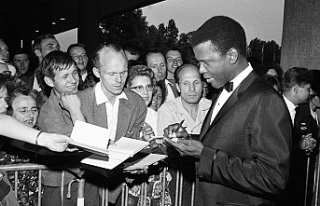Sydney Poitier, American actor winner of two Oscar awards and known by guess who comes tonight and in the heat of the night, has died at 94 years in Bahamas, on the islands in which he grew up and where his family came from. The Prime Minister of the Archipelago has given the news.
To achieve to understand who was and what it meant, who is and what it means (and from now on and forever, who will be and that it will mean) Sidney Poitier in the history of cinema, there would be perhaps to stop before first, in history without plus. In 1968, a year after the magical year in which the actor, born in Miami in 1927, will star in his three movies more rewarded (rebellion in the classroom, in the heat of the night and guess who comes tonight), in The United States, the Supreme Court had just declared unconstitutional laws against miscegenation still in force in many states. And this in a climate that socially became a simple kiss in the STAR Trek series between Captain Kirk and Lieutenant Uhura as the bodies of Harry Belafonte and Petula Clark at the Prime Time Televivo.
And in that atmosphere of segregation, injustice, struggle for civil rights and violence (a lot of violence) was the man who gave with the key since dignity, tranquility and the clarity of reason. That said, it sounds tremendous, but reviewing the filmography of it is first of all a demonstration of the power of cautious calm, of astute intelligence and rebellion always pending. Then, and even more now that any consensus or agreement seems so suspicious, Sidney Poitier rose (and rises) rather than as a simple actor as the incarnation of the necessary society in front of the lie and the cult of hatred. He has died at 94 and the legacy of him seems now more opportune than ever.
In rebellion in the classroom, James Clavell's film where he did from the teacher that we all wanted to have after having incarnated ten years earlier in seed of evil to the irredeentum student who maybe we went, one of his students says: "You are like us, but you are not". And perhaps in the almost accidental and completely contradictory phrase, Lulu (she is) just defining what ever any spectator, beyond the color of the skin, appreciated in Poitier. The characters of her always embodied the distillate of everything that anyone identifies as desirable, the fullest, right, but that - for the reason that it is: by impeachment, lack of perseverance or simple stupidity - never reaches.
He, in fact, was like us, but much better, more elegant, more correct, smarter, better dress.
His first paper of consideration came from Stanley Kramer's hand in 1958. Fugitives was the chronicle of two prisoners to the escape, but above all it was the perfect metaphor first of a country and then, and without exaggeration, of the human condition itself as Social animal Chained, he and the racist who gives life Tony Curtis, rather than learning to live together simply come awareness that living is that: a leak and certainty of some chains. Subsequently, in the key is the question (1962), from Hubert Cornfield, he would repeat as a black man (psychiatrist) faced with the intransigence of a sick Nazi. And that is there, in the tireless need to explain again and again the obvious without lifting (or almost) the voice where Sidney Poitier forged the character of him. Somehow, he was the chosen one to explain the indefatigable struggle that requires reason to the world. It was like all, yes, but better.
Review your filmography over 50 and 60 has a lot of conjunctural reading and reflection of your time, but also of a graphic and permanent example of the sense of democracy itself, of coexistence without further. Never give evident in known. In a lunar in the sun (1961), by Daniel Petrie, he embodies a man committed to leaving the ghetto. His in this case is a personal struggle in an entirely black distribution that is debated precisely the white shadows on the other side, the Society of Alien that does not belong to him or love him. In the Lilies of the Valley (1963), Ralph Nelson Ribbon who earned him the first Oscar (then would receive another honorific), he rises as the perfect image of the only possible meeting place. Again poitier condemned to be metaphor. The vagabond locked in a convent between nuns is also the only possible man with whom to agree, in which to recognize and next to him to live. Forever. A blue binding (1965), by Guy Green, would be another examples of this route towards fair and, in addition, this time, towards the fatal. The friendship of him with a young white woman is revealed only as possible by the blindness of the latter. We are before a vocational melodrama and if you want naive, but also provocative, visceral and, on your own, edifying thanks exclusively to the kindness understood from the indefatigable rigor of a poitier paper. Like everyone, but more.
And so until reaching 1967. In the heat of the night, of Norman Jewison, his role by Virgil Tibbs defines before anything a way of being in the world. The phrase "call me Mr. Tibbs" Every time someone goes to him as "boy" is more than just a simple affirmation of identity, it is a requirement of recognition that funds a world, a space, the only possible society. Despite the appearance of thriller, the film is about compassion, from the other. And so it is every time the black detective touches a white body. And so it is even when the black detective hits his white companion racist (Rod Steiger). It is not really a simple movie, it is a statement of principles; The righteous principles.
Guess who comes tonight, from Stanley Kramer, it's another thing and, at the same time, the same thing. "You see yourself as a black man, I see myself as a man simply," says young poitier to his father in front of the immense and perfectly white couple formed by Spencer Tracy and Katherine Hepburn. He wants to be the representative of a new generation, of a new time that is imposed. Actually, he wants to be and is the living image of a desire always pending. The Black Lives Matter movement reveals to what extent everything that was wanted in 1967 remains only that: I want. Like everyone, but the first one.
The years would spend, Poitier would incarnate Mr. Tibbs twice, gave life on an occasion to Mandela and his career would always be attentive to the myth of his own incarnate without macula. And forever. "The type of black played on the screen was always a jester, a clown or a butler. This was the panorama when I arrived at the movies, but I chose not to be a participant of these stereotypes ... I want people to feel when leaving the theater that Life and human beings are worth it. That is my only philosophy, "he said on one occasion. In 1968, he became the most profitable actor of the moment. He was perhaps because he managed to be exactly the same as all by force to give life to which we all want to be. Like everyone, but better.
Date Of Update: 07 January 2022, 13:10











